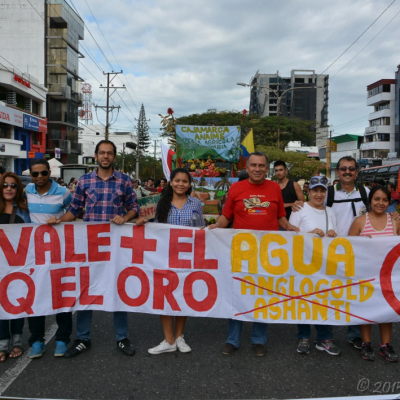Iglesia Cristiana Menonita de Ibagué, located in Tolima, Colombia, requests prayer regarding mining in their region. They are opposing an open pit gold mining operation that is awaiting approval. Secondly, they are hoping that a referendum enabling the citizens of their city to vote for or against large scale multinational mining activities will go forward. The mines threaten their community’s water source and agriculture.
The MCCN liaison from this congregation is Jose Antonio Vaca Bello. He writes:
“June 3 is the eighth annual Marcha Carnaval, this year held to protest the mega mining project of la Colosa, an open-pit gold mining operation of Anglo Gold Ashanti in the municipality of Cajamarca. This project is currently in the exploratory phase and is awaiting approval from the state environmental authorities [who grant mining permits]. If the Colosa project were to be granted a permit, it would have tremendous implications for water resources, specifically the Coello River, directing immense volumes of water for the mine’s use, not to mention the environmental risk for contamination of mercury and cyanide. The economic and social impact for irrigation and the agricultural sectors that depend on this water would be affected.
“But this is not the only mining project that affects our biodiversity and water sources. 58% of the land in our municipality has been granted title deeds for mining and in particular 39 title deeds around the canyon of the Combeima River, the main source of water for the majority of the 500,000 residents of our city. In addition, numerous title deeds for mining have been granted in zones that should be forest reserves.
“For this reason the new administration in charge of the City Council and Mayor Guillermo Jaramillo have promoted a legal recourse permitted by our political constitution. It says that the citizens can take a stand regarding the use of its land. For this reason the creation of a Popular Mining Referendum was approved, but the economic interests of the mining companies, the Ministry of Mining and the [procuradería–some government official like attorney general, but at the state/regional level?] are boycotting the process and have stopped it as it sits before the Administrative Tribunal of Tolima [Ibagué is the capital of the department/state of Tolima].
“We hope, however, that this initiative will be approved and that a date can be set for the referendum. At least 130,000 residents would have to go to the polls to vote for or against large-scale mining on our land, responding to the question, “Do you approve—yes or no—that the municipality of Ibague would carry out mining projects and activities that would imply the pollution of the soil, loss or pollution of the water supply and negative impacts on the agricultural industries in the municipality?”
“As the Mennonite Church of Ibagué, we hope that we can join the numerous environmental and civic organizations to accompany, support, and spread the word of this initiative. We request your prayers that the God of Life, our Creator, would allow this initiative to be carried out, even though the gods of power and money oppose it. If the referendum would be successful, it would be the first time a capital city has utilized this kind of mechanism. It would represent a great advance in the environmentalist movement and of the communities in the region, whose agricultural work is threatened by the arrival of multinational mining companies.”
Thanks to Elizabeth Miller for translation.
